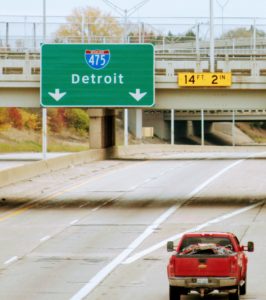By Coner Segren
Federal relief dollars coming to Flint will be “transformational,” Mayor Sheldon Neeley predicted at the recent monthly meeting of Flint Neighborhoods United (FNU).
Participants in the Zoom meeting also heard updates about expected funds for several highway projects, prospective demolition of Brown Funeral Home, and access to funds for home repair.
Neeley says millions in federal relief dollars will be a “game changer”
Flint and Genesee County will receive millions in federal relief from President Joe Biden’s American Rescue Plan, Neeley said. Flint will receive a direct relief payment of approximately $99 million. Neeley also said that a further $114 million is to be allotted for Flint Community Schools, as well as $77 million for Genesee County. “This is a game-changer for us all,” Neeley said of the money.

Mayor Neeley speaking at a Black History Month event in February 2021. (Photo by Tom Travis)
With summer approaching, Neeley listed crime prevention as a top priority. He specifically cited residential speeding, reckless driving, an illegal dumping as things that would not be tolerated in the city, and that will be prosecuted to the fullest extent of the law. For tips that lead to arrests, the city will pay rewards of up $1000.
Although the state moratorium on water shutoffs ended March 31, Neeley said he would not shut off any residential water users in the city. “We believe that water is a human right, we understand that, and we will fight our way through,” he said. Neeley said, however, that he would shut off water to habitual commercial non-payers. These are businesses who have continually avoided paying taxes and water bills to the city over prolonged periods of time.
Flint, along with EPA begins demolition on site of former Brown Funeral Home
The site of the former Brown Funeral Home on Davison Road has been slated for demolition and cleanup by the Environmental Protection Agency (EPA) after the building was destroyed by a fire last November. In addition to the fire damage, the property, which is owned by the Genesee County Land Bank, was found to be contaminated with friable asbestos throughout the ruins and debris after an EPA survey.

Photo source: EPA
The EPA has also done periodic air sampling in the months after the fire, and has found no evidence of airborne asbestos or any other hazardous materials. According to Jackie Cole, the on-scene coordinator for the EPA, the demolition and cleanup is being done as a proactive measure. “With weather, and with the elements, and the fact that this is just essentially debris and ruins at this point, it will get worse…but to date we haven’t found any asbestos fibers in our samples,” she said.
The EPA is approaching the demolition with caution. For the safety of residents, fencing will be placed around the work zone. In order to protect residential areas surrounding the site, the EPA will also be conducting daily air sampling procedures to make sure asbestos and dust are not airborne. “A big part of this and the safety aspect is keeping dust minimized,” Cole said. “our air monitoring is real time; we get real time alerts on our phones…so if there is any exceedance it’s immediately addressed.”
In addition to the precautions around hazardous materials, the EPA will also be operating under strict COVID safety rules.
Cleanup will occur between Monday and Friday between 7 a.m. and 5:30 p.m. No heavy machinery will be in operation before 8 a.m. in compliance with local noise ordinances. According to Cole, the cleanup should be completed by the summer of 2021.
Any residents with questions or concerns can contact Jackie Cole at cole.jacquelyn@epa.gov or by phone at (312) 597-4421 or you can visit the project website at www.response.epa.gov/formerBFH
Metro Community Development funding home repair
Metro Community Development (MCD) has been given grant money that will allow homeowners to make needed repairs to their homes, according to Brian Glowbiak, Metro Community Development CEO. The Neighborhood Improvement Program (NIP) provides homeowners with up to $10,000 dollars per household for things like new roofing, new windows, new doors, new furnaces or air conditioning, with no repayment or liens placed upon your home.

Photo source: Metro Community Development
To qualify, the home must be your primary residence, you cannot have received money through the program in the last 5 years, must be current on homeowner’s insurance and your household income cannot exceed 80% Area Median Income (AMI). You must also provide proof of residence and income.
MCD is also funding another program called the Accessibility and Mobility Program. This program provides up to $7,500 dollars per household to make your home more accessible. The funding can be used for things like ramps, replacing carpeted floors with hardwood, moving laundry machines to the first floor, walk-in showers and tubs etc.
The program is geared towards seniors aged 62 and older or if a person in your house has a permanent disability. The requirements for the program are largely the same as NIP.
In the past, MDC has not been able to draw down the full amount of funding for the Accessibility and Mobility Program due to lack of applications.
“My goal is to raise awareness of both and hopefully promote awareness of that accessibility program,” Glowbiak said. “My goal is to be able to draw down the full amount of funding for this program, which is about $700,000 under this program.”
Applications must be submitted to the Federal Home Loan Bank starting on May 4. Funds are first-come, first-serve.
Residents interested in the program can visit Metro Community Development in person on 1174 Robert T. Longway. They can also call (810) 767-4622 Ext. 360
Bond Funding to pay for highway redevelopment
The State of Michigan is providing $400 million to repair I-475 and I-69 in Genesee County. The money is part of a larger bond issue the state has floated for major highway redevelopments all across the state.
According to Trevor Block, project manager for I-475 at the Michigan Department of Transportation (MDOT), the influx of money has allowed MDOTC flexibility for deciding whether to simply repair I-475 as is or turn it into a boulevard.

Saginaw St. entrance to I-69 downtown Flint. (Photo by Tom Travis)
MDOT is seeking community input on the plan, and will be conducting what is known as a Planning and Environmental Languages Study. The plan will bring together community groups, the City of Flint, MDOT, and other major stakeholders to be part of a collaborative process to figure out how to best allocate the money.

I-475 corridor downtown Flint. (Photo by Tom Travis)
In addition to the state bond, Block also said the Biden administration has pledged $20 billion dollars of federal money to help reconnect communities that had been unfairly separated during the initial construction of the interstate system. According to Block, MDOT has been in contact with the federal government and Flint is near the top of their priority list for federal funds.
EVM Reporter Coner Segren can be reached at csegren@umich.edu.


You must be logged in to post a comment.